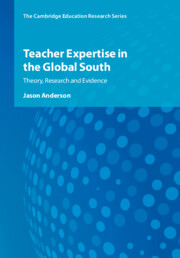Book contents
- Teacher Expertise in the Global South
- Teacher Expertise in the Global South
- Copyright page
- Contents
- Figures
- Tables
- Acknowledgements
- Abbreviations
- 1 Introduction
- 2 The Construct of Teacher Expertise
- 3 The Expert Teacher Prototype
- 4 Effective Teaching in Low-Income Contexts
- 5 Researching Teacher Expertise in the Global South
- 6 A Portrait of Teacher Expertise
- 7 Exploring the Quintain
- 8 Diversity in Expertise
- 9 Teacher Expertise in the Global South
- 10 Updating the Expert Teacher Prototype
- 11 Valuing and Building on Southern Expertise
- 12 Concluding Reflections
- References
- Index
8 - Diversity in Expertise
Where Is There Difference and Why?
Published online by Cambridge University Press: 18 May 2023
- Teacher Expertise in the Global South
- Teacher Expertise in the Global South
- Copyright page
- Contents
- Figures
- Tables
- Acknowledgements
- Abbreviations
- 1 Introduction
- 2 The Construct of Teacher Expertise
- 3 The Expert Teacher Prototype
- 4 Effective Teaching in Low-Income Contexts
- 5 Researching Teacher Expertise in the Global South
- 6 A Portrait of Teacher Expertise
- 7 Exploring the Quintain
- 8 Diversity in Expertise
- 9 Teacher Expertise in the Global South
- 10 Updating the Expert Teacher Prototype
- 11 Valuing and Building on Southern Expertise
- 12 Concluding Reflections
- References
- Index
Summary
This chapter systematically analyses observed differences among the eight teacher participants in the case study, both to understand the nature of these differences and to investigate potential causes. It makes use of an analytical framework that emerged during data analysis to position the eight teachers on a two-dimensional field according to two broad areas of clinal difference theorised – ‘Conception of Subject’ and ‘Degree of Control’, which are partially analogous to Bernstein’s (2000) constructs of ‘classification’ and ‘framing’. More specific features of pedagogic practice where variation was evident were plotted on the field equidistant between teachers who shared them to find that the likelihood of a teacher engaging in each was well predicted by the two key variables. The chapter concludes by offering critical reflections on Bernstein’s sociological framework, arguing that while certain elements (e.g., classification and framing; performance and competence models) offer useful insights into differences in practices among Indian teachers, others (namely official and pedagogic recontextualising fields) fail to capture the complex, multiple layers and relations influencing classroom practice in basic education in India.
Keywords
- Type
- Chapter
- Information
- Teacher Expertise in the Global SouthTheory, Research and Evidence, pp. 163 - 186Publisher: Cambridge University PressPrint publication year: 2023

